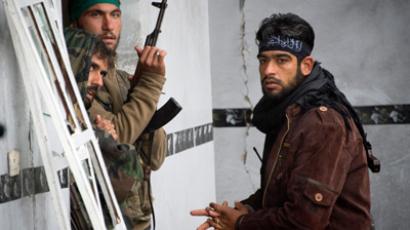Christians flee Syria’s Kessab, Twitter cries atrocities, Armenia accuses Turkey
The Syrian Army is trying to retake the Christian majority town of Kessab reportedly seized by al-Qaeda-linked forces. The attack made hundreds of ethnic Armenians flee and caused international outcry with Armenia blaming Turkey for supporting extremists.
Warring sides in Syria are facing off over Kessab, an ethnic Armenian hub on the Turkey-Syria border. The town was taken by Jabhat Al-Nusra, forcing hundreds of residents to flee and sparking international outcry.
Kessab – located in Syria’s Latakia province, just miles away from Turkey – fell to rebels sparking a fierce battle in the media as conflicting reports are coming in about the events in the town which is home to over 2,000 ethnic Armenians.
On March 21, extremist groups affiliated with al-Qaeda reportedly crossed into Syria from Turkey and seized the town after clashes with Syrian government troops and local self-defense squads.
The Armenian govt called on the UN to protect Kessab, evoked the Armenian genocide, and accused Turkey of allowing Jihadists cross their border to attack Kessab. Ankara slammed the accusations and condemned the charge as ‘confrontational political propaganda’ .
Hundreds flee
Arman Saakyan, Armenian MP from the Republican Party has recently returned from the Syrian town of Latakia, where he managed to talk to Kessab refugees. He told RT that the armed groups got into Syria’s Kessab from Turkish soil.
“In the early hours on Saturday [March 22] Turkish border guards disappeared and terrorists, representatives of different countries, attacked Kessab from there with the support of artillery,” he said.
With the help of local self-defense forces and the Syrian army the majority of ethnic Armenians managed to flee Kessab and are currently resided on the territory of an Armenian church in the coastal city of Latakia, the parliament member said. Only some elderly people still remain in the town "occupied by militants from the al-Nusra [Front],” he added.
A group of residents found shelter in St. George's Armenian monastery in Latakia, about 60 km from Kessab, according to a stringer for RT video agency Ruptly.
“Everyone gathered and started going towards Al-Nabien to be safe. We along with the army and the national defense forces we saved as many as we could,” Father Maron, a priest from the town told Ruptly. “40 more people remained in Kessab - mostly the old and immobile - but we managed to gather the majority and most of the families came to Latakia.”
The residents of the town managed to escape in the very last moment before “their homes were attacked,” Bugus Kazaryan, the chair of the Armenian Community Council in Latakia told RT. He said around 850 families from Kessab – “not only Armenians, but also residents of other nationalities” – have currently taken shelter in Latakia.
They fled the town in order to let the Syrian Army “destroy the terrorists who only came to Syria to kill, they’ve got no other goals,” Kazaryan said.
“The bombardment started early morning. We struggled to save our son. We were laying on the ground because of the heavy bombing. We could take nothing from our home,” Kessab resident Hrach Chegelian told RT.
“We took nothing with us. No clothes – we just left with what we were wearing at that moment,” Siran Demirchian said.

During the past several days a number of reports have been circulating in media and online, claiming violent atrocities by rebels, manslaughter of Armenians in the area. One of the videos is said to show the massacre of Armenians in Kessab by rebels. Extremely graphic footage, picked-up by several media and web blogs, showed unknown people being shot in the heads by unidentified attackers.
However, the footage apparently had nothing to do with Kessab. The video posted online mid-March by Al-Nusra Front allegedly depicts execution of Syrian soldiers in Aleppo last December. So far, there is no confirmed information that any of Kessab’s civilians died due to fighting.
Other reports suggested that rebels desecrated and destroyed historic churches in the area, as they entered the town. The reports are yet to be independently verified. A number of YouTube videos apparently shot by militants showed the deserted town of Kessab, while some churches featured in the videos appeared to be untouched at the moment of filming.
#SaveKessab
During the past weekend, reports about Kessab rapidly spread on social networks with allegations emerging of extremists perpetrating brutal atrocities against ethnic Armenians.
The Twitter storm was also provoked by the news, with Kim Kardashian, Cher and Jared Leto supporting the call for help from the city’s Armenians. A special hashtag #SaveKessab has become one of the most popular.
Please let's not let history repeat itself!!!!!! Let's get this trending!!!! #SaveKessab #ArmenianGenocide
— Kim Kardashian (@KimKardashian) March 30, 2014
Ethnic Armenians who fled the area urged Armenian Diaspora to apply “to their government, the UN or any other structures to interfere in this case.”
“All we want is to live. If you ignore our appeal, we will be violently killed by extremists, same as it happened in Aleppo…and other places on the Syrian territory,” says the statement on Facebook drafted by Armenian MP Arman Saakyan.
“Today, on Mother’s Day, our beautiful city was violently attacked from Al-Qaeda and the extremist group Front Al-Nusra, which get the full military and material and technical support from the side of the Turkish government.
We woke up long before sunset, horrified by the sounds of the missiles which were falling on our city. Thousands of terrorists reached the border of our city. The Turkish side conducts the policy of destroying our beautiful Kessab exactly on the 100th anniversary of the Armenian genocide in the Osman Empire,” Armenians said in the statement.
“They killed Armenians three times in the same location: in 1909, 1913, and now in 2014,” Ja’afari added, stressing that Turkish tanks and artillery cover the rebel forces and help them.
Armenia-Turkey-Syria standoff
The attack on Kessab was reportedly carried out by fighters from the Nusra Front, an Al-Qaeda-linked jihadist group in Syria, and the Islamist Ahrar al-Sham brigade, part of the Islamic Front alliance. Militants posing with brigade's flag near Kessab border-crossing are seen in the photo below, which was likely taken shortly after the seizure of the checkpoint.
Rebels robbing homes, desecrating churches in #Kessab, several #Armenians can't leave http://t.co/16ykbdjnkx#Syriapic.twitter.com/j0SzBbYAQC
— Khatchig Mouradian (@khatcho) March 23, 2014
An amateur video circulated on the internet appears to show armed men freely strolling through the Kessab checkpoint, apparently at the Turkish-Syrian border, with no border guards seen on either side.
"We saw them coming with huge groups. We were told not to fire. The rebels were backed by Turkish soldiers. When they reached our village, we started to shoot. But we couldn’t do any more. There were only seven of us. So we escaped and came back through the forest. We woke up the people of Kessab and they started to leave the town," Kessab resident Gevorg Nazarian told RT.
Earlier in the week, the Syrian army launched an operation to force the militants out of the town, located in a region of strategic importance for Damascus. In the course of the three year civil war, Assad's army has already lost control of most border crossings. It had though held on to Kessab, a gateway to the province of Latakia which has remained an Assad stronghold. By seizing the town, militants got their first outpost on the Mediterranean Sea.
Echoing claims coming from Yerevan, Syrian authorities also pointed the finger at Ankara for providing “cover for this terrorist attack,” cited Reuters.
Adding fuel to the fire, on March 23 Turkey shot down a Syrian Air Force jet at the Kessab crossing. Turkish Prime Minister Recep Tayyip Erdogan said the plane was intercepted after it violated his country’s airspace.
Damascus in response accused Ankara of “blatant aggression,” saying the fighter jet had been over Syria. The Syrian pilot said that a Turksih aircraft fired a missile at him while he was pursuing terrorists within Syrian territories, SANA agency reported.
Moscow expressed concern over the attack on Kessab, saying that the activities of the rebel forces are aimed at wrecking the chemical demilitarization of Syria.
“The seizure by extremists of the town of Kessab elicited a broad response in Armenian communities throughout the world. A demonstration took place in front of the UN office in Yerevan with the demand for the persecution against ethno-confessional minorities by illegal armed units to be put an end to in Syria. Simultaneously, the leadership of the Republic of Armenia expressed its gratitude to the Syrian government for the defense of the Armenian population,” the Russian Foreign Ministry said in a statement, quoted the Voice of Russia.
Washington said it was “deeply troubled” by the events.
“We are deeply troubled by recent fighting and violence that is endangering the Armenian community in Kessab, Syria and has forced many to flee,” said State Department Deputy Spokesperson Marie Harf.
“All civilians, as well as their places of worship, must be protected,” she said, “We have long had concerns about the threat posed by violent extremists and this latest threat to the Armenian community in Syria only underscores this further,” Harf added.














